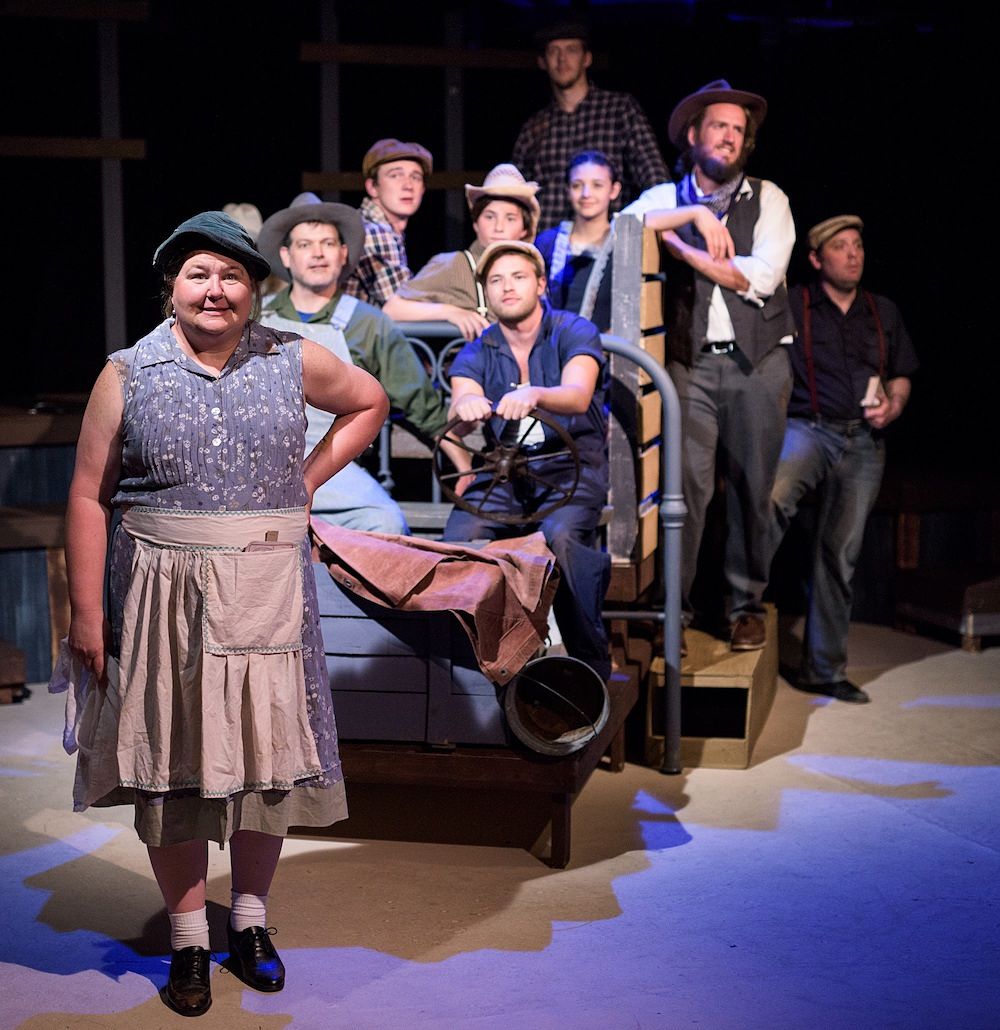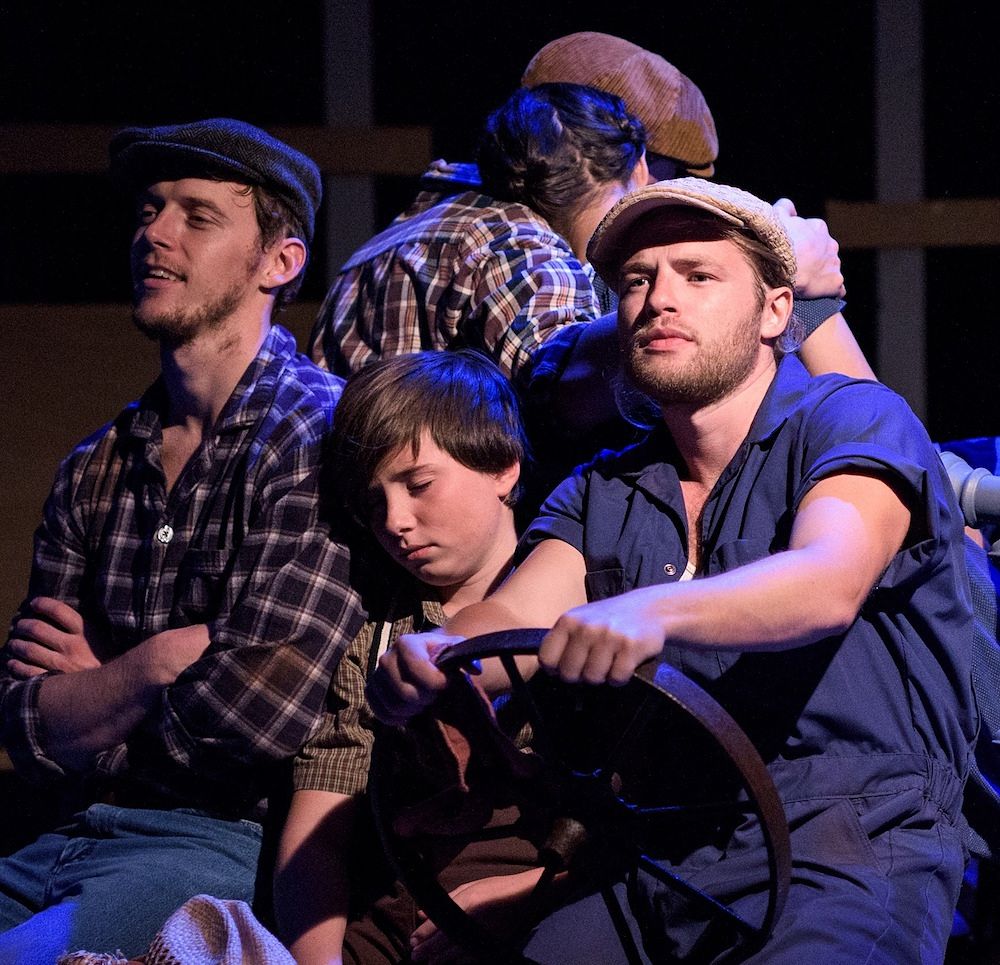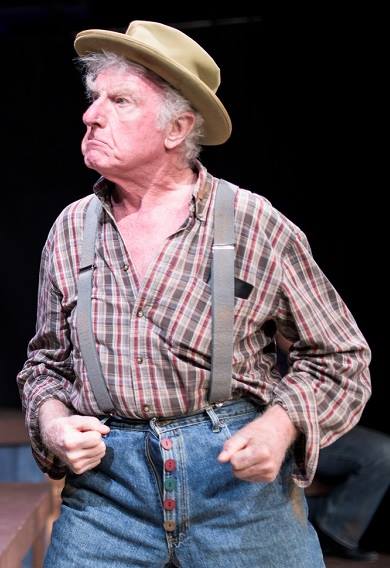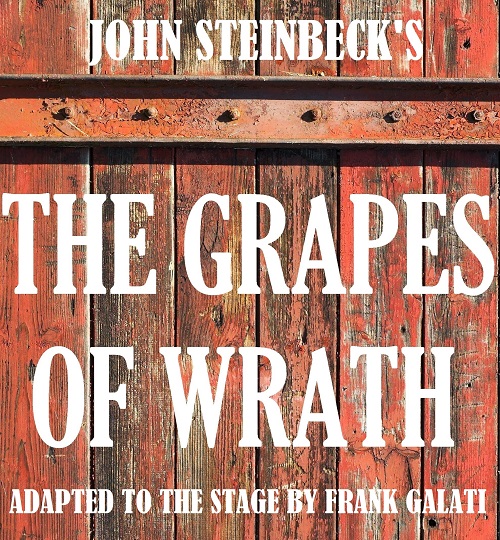Review: The Grapes of Wrath by City Theatre Company
by David Glen Robinson
Onstage now at City Theatre on the east side is a play about the struggle to be human. Yes, City Theatre has undertaken an adapted stage presentation of John Steinbeck’s The Grapes of Wrath. The well-known tragedy continues to offer generations of Americans sometimes-harsh lessons on the human condition.
Steinbeck’s canonized 1939 Pulitzer Prize-winning novel The Grapes of Wrath places uneducated regional migrants at the epicenter of the rending social upheaval of the Great Depression. The author matches the frailty of humanity to the enormity of the landscapes they traverse in a truck that becomes its own tragic character. It is not too great a stretch to think of Steinbeck as the Ansel Adams of the human condition.His semi-articulate characters gain insight through loss after loss, and their lives seem as enormous as Adams’ mountains and forests, yet quaking and tearful beneath an overpowering and impersonal universe. Tom Joad’s path to maturity begins after prison, not in it.Ma Joad knows that this same pathway never finds its end while we tread the earth, as when she counsels Rose of Sharon that women see adversity as eddies and pools in the river of life that keeps flowing regardless.

The comparison to today is direct, but not exact. Today’s migrants cross a river to find work. Steinbeck’s migrants cross a river to find no work. Steinbeck’s characters’ promised land is imaginary; the reality of it is as depressed as the land they left, but for slightly different reasons.
 Frank Galati took on a huge task when he adapted Steinbeck’s novel for the stage. His strategy seems to string together the dramatic high points and emphasize only the main characters and minor characters as they support the drama.This seems logical, but when the highpoints are presented one after another without relief, they seem like painted theatrical backdrops stacked together after a show. The panels lie closely together, and their imagery protruding around the sides and top takes on a flattened, 2D aspect. The 3D illusion of the image is gone.
Frank Galati took on a huge task when he adapted Steinbeck’s novel for the stage. His strategy seems to string together the dramatic high points and emphasize only the main characters and minor characters as they support the drama.This seems logical, but when the highpoints are presented one after another without relief, they seem like painted theatrical backdrops stacked together after a show. The panels lie closely together, and their imagery protruding around the sides and top takes on a flattened, 2D aspect. The 3D illusion of the image is gone.
So it is with Galati’s Grapes of Wrath. The major characters, those named Joad and a few others, are played by talented actors who labor hard to tell the story and convey its unrelenting pathos.It is the ensemble actors and their multitudes of characters that throw the play over the top in achieving a theatrical reality, that of the U.S in the Great Depression. Their cameolike and one-scene appearances work to unite Oklahoma and California in this Dustbowl tragedy.
In this regard, the focal scene that gives some emotional relief to the unrelenting dread of Act 2 is the square dance in one of the migrant camps. Surprising us with about two lines of foreshadowing, the scene starts when the caller (Chuck Winkler, titled Dance Emcee in the program) enters to a panel upstage center, and steps the dance, as callers always do. Characters clap in rhythm but nobody dances the square dance. Everyone could square dance at that time. But then we receive another treat: Winkler launches into an exquisitely wistful version of the 30s favorite, “Beautiful Dreamer,” and the scene dissolves into couples enacting breakout scenes.
Chuck Winkler is an impressive talent find for City Theatre and the Austin performance community. His program bio cites his musical and theatrical work with Robert Wilson in Houston.He seems to have mined this play for its emotional gems.He also plays Man Going Back, a traveler going back to Oklahoma who issues dire warnings to the Joads about California.He shows instability but finally explains himself in contemplation of a photograph of his children. The scene is an emotional scale monologue of shattering intensity. Why Mr. Winkler left Houston to traverse the arid wastes and land in the theatrical fruit-picking camp of Austin is beyond comprehension.One hopes he does not metaphorically reprise the role of Man Going Back.
 There are other stars. Galati’s adaptation is disinterested in relieving the monotonal emotional arc with humorous dialogue or characters.Another is the character and dialogue of Grampa Joad, played by John Meadows. His Grampa is an animated cartoon character, but a winning one in Meadows’ care. Otherwise, the voice of the turtle is heard in the land of Frank Galati’s adaptation.
There are other stars. Galati’s adaptation is disinterested in relieving the monotonal emotional arc with humorous dialogue or characters.Another is the character and dialogue of Grampa Joad, played by John Meadows. His Grampa is an animated cartoon character, but a winning one in Meadows’ care. Otherwise, the voice of the turtle is heard in the land of Frank Galati’s adaptation.
Freddy Carnes is an ensemble member playing three characters, notably Floyd Knowles.Carnes’ voice work as Knowles stands out strongly without stealing focus or becoming stereotypical. The talented Mike Dellens plays four really brief characters but seems underutilized in The Grapes of Wrath.
Henry Fonda immortalized Tom Joad in the movie version. Ty Wiley knows to play monumental characters slightly off to deflect comparisons.He accomplished a greater subtlety as well: he plays an uneducated character as open rather than empty. By the end he has been filled, and he looks out on the world sad-eyed and world-weary .His character arc was immense, and there was no doubt about his actions.

Robyn Connor inhabits Ma Joad, her arms and shoulders emerging from her sleeveless blouse to broadcast the strength that would hold the family together. Connor is a Ma Joad for all time.
Zach De Sutter plays Jim Casy (Casey?) the ex-preacher whose spiritual quest leads him to become a labor organizer, a fellow traveler with the Joads, a socialist, and a “Red.” It is this reviewer’s opinion that Casy is the Steinbeck figure in The Grapes of Wrath, one of lengthy monologues on the human condition, especially about the socialism of finding enough to eat.
The production as a whole succeeds on the energy of this cast, just as Director Andy Berkovsky alerted us in his curtain speech. The cast made the City Theatre standard multilevel plywood panel set work, and they overcame a certain problem with scene changes. The lighting sets don’t recede to a level dark enough to cue the audience that a scene has ended and yet still give the cast enough light to change the set. So the situation becomes one in which actors on-scene suddenly drop their characters and start moving props in full view of the audience. In our curtainless theatrical modern day we need more set adroitness, not less.
One final, small note: fist pumps and high-fives did not exist in the Great Depression.
The cast’s finest accomplishment is overcoming the peculiarities of Frank Galati’s adaptation. In sum, City Theatre’s production of The Grapes of Wrath remains true, true, dreadfully true to Steinbeck’s sorrow and paean to the human spirit.
The Grapes of Wrath is recommended to all fans of Steinbeck. The play runs from August 10 to September 2, 2018 at City Theatre on Airport Boulevard on the east side.
The Grapes of Wrath
by Frank Galati from John Steinbeck's novel
City Theatre Company
August 10 - September 02, 2018
August 10 – September 2. Thursdays - Saturdays 8:00 pm. Sundays 3:00 pm.
The City Theatre. 3823 Airport Blvd. Austin 78722.
General Seating $15. Center Row Reserved $20-25. Thursday all seats $10.
Tickets at the door $20. Group and student discounts.
Tickets 512-524-2870 or info@citytheatreaustin.org. www.citytheatreaustin.org
